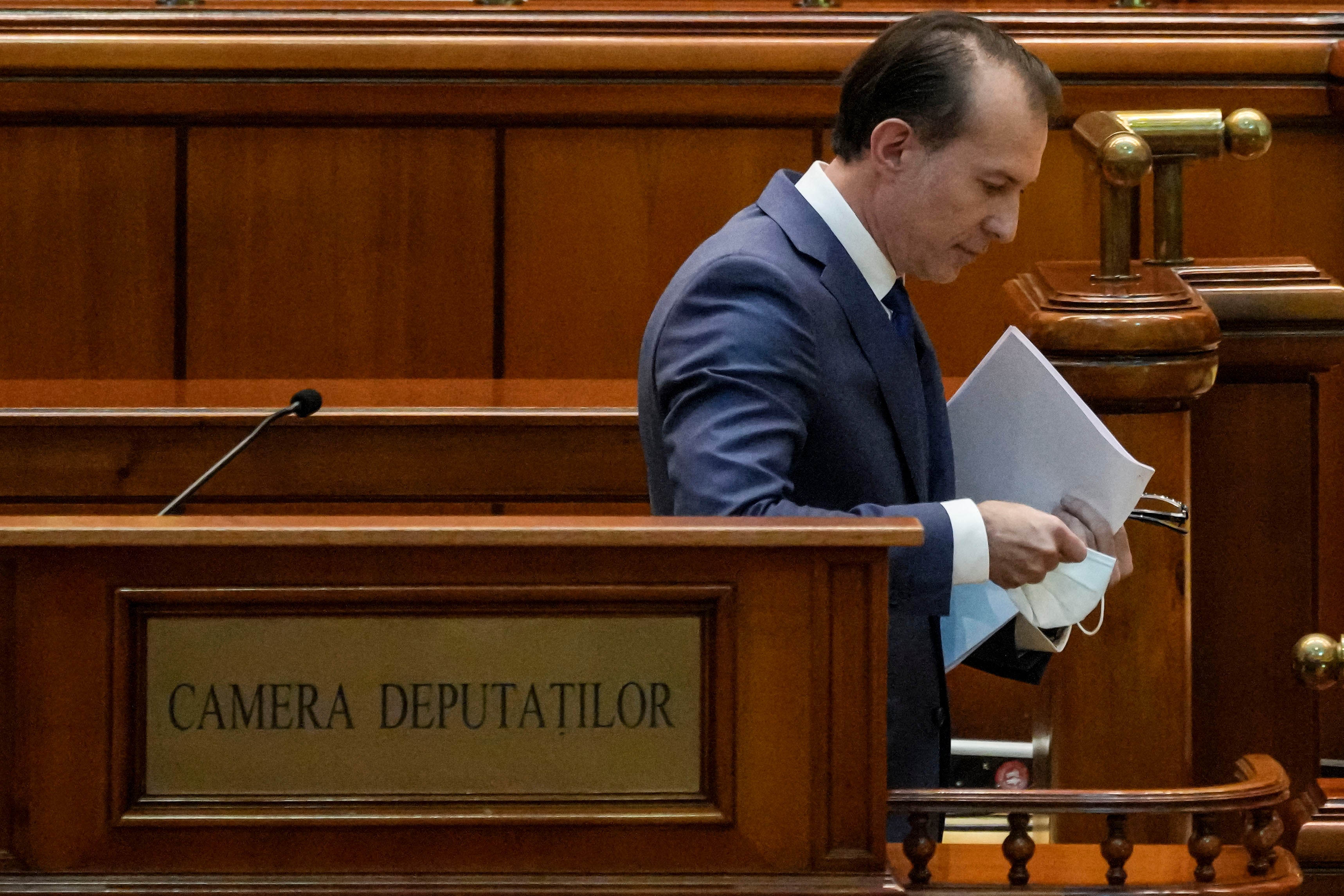Romania’s government collapses amid political crisis
The fallout came amid fractions in parliament and within the Liberal ruling party that threatens the country’s efforts to tackle the Covid surge

Your support helps us to tell the story
From reproductive rights to climate change to Big Tech, The Independent is on the ground when the story is developing. Whether it's investigating the financials of Elon Musk's pro-Trump PAC or producing our latest documentary, 'The A Word', which shines a light on the American women fighting for reproductive rights, we know how important it is to parse out the facts from the messaging.
At such a critical moment in US history, we need reporters on the ground. Your donation allows us to keep sending journalists to speak to both sides of the story.
The Independent is trusted by Americans across the entire political spectrum. And unlike many other quality news outlets, we choose not to lock Americans out of our reporting and analysis with paywalls. We believe quality journalism should be available to everyone, paid for by those who can afford it.
Your support makes all the difference.Romania’s minority government lost a no-confidence vote on Tuesday amid a political crisis triggered by poor management of the Covid-19 crisis, internal political rivalries and a large budget deficit.
The government of Prime Minister Florin Citu lost by a significant margin as 281 deputies and senators voted against it, just nine months after taking office.
“Citu’s government fell with a big margin, way above the minimum required (of 234 votes)”, an opposition deputy overseeing the ballot boxes told Reuters.
The Liberal-led government came to power following a parliamentary election last December.
Mr Citu’s government was in limbo for a month after he sacked Justice Minister Stelian Ion for not signing off on a regional development programme.
Mr Ion was the second member of the USR Plus, Mr Citu’s former ruling coalition partner, to be sacked after health minister Vlad Voiculescu was dismissed in April.
USR Plus’s ministers and the party leader all resigned in protest. They later reached out to the opposition ultra-nationalist AUR and leftist Social Democrats (PSD) to back a no-confidence vote against Citu’s government.
During the debates in parliament on Tuesday ahead of the vote, Mr Citu lashed out at USR-Plus, saying he had tolerated “a team of incompetents.”
The Romanian President Klaus Iohannis will now consult legislators on appointing a new prime minister, while Mr Citu may remain at the helm for 45 days. The president will need to nominate a new prime minister, which could be Mr Citu again.
After Tuesday’s vote, Mr Citu reportedly said: “It does not end here. One government falls, but I will build another, one based on liberal values.”
But his bid to cling to the premiership will likely face broad opposition from rival parties. Mr Citu’s Liberal party (PNL), which holds 134 of the 436 seats in Romania’s parliament, has been increasingly isolated since the political crisis deteriorated in August.
In his bid to form a new government, Mr Citue would need to secure new alliances. Analysts say he will find it challenging to gain the support of the main opposition party and can only count on the backing of the Democratic Alliance of Hungarians in Romania (UDMR), which holds only 30 seats.
Claudiu Tufis, an associate professor of political science at the University of Bucharest, told the Associated Press he expects the outcome to be a Liberal cabinet with support from the Social Democrats. “In parliament, but not in the cabinet,” he added.
USR Plus has expressed a wish to restore the coalition with a different prime minister.
The other option for Mr Citu will be to try and seek a minority government - potentially halting reforms to tackle the large budget and current account deficits and delaying recovery plans until after the coronavirus pandemic, given the fragmented parliament and different factions within the parties.
A snap election, which would only be triggered if parliament rejects two proposed cabinets within 60 days, looks unlikely as it has never happened before - with lawmakers traditionally finding a way forward, however fractious.
Mr Citu has previously said his Liberal team would negotiate to keep the government’s majority to try to see off the threat.
However, last month, a PSD spokesman told POLITICO that his group would not support a minority government led by Mr Citu. “We do not support and would not vote” for a minority government, he said. “The fairest thing would be to have early elections,” he added.
Mr Citu has also faced a precarious situation inside his party amid his months-long, sometimes acrimonious internal election at the PNL, which saw him taking on ex-prime minister Ludovic Orban as part of his campaign for the leadership of the party.
The crisis could hamper Romania’s efforts to tackle an alarming surge of Covid-19 infections in the eastern European nation of 19 million, which is putting the country’s hospitals under serious strain.
On Tuesday, Romania recorded its highest number of daily infections - 15,037 - since the pandemic started.
Additional reporting by agencies
Join our commenting forum
Join thought-provoking conversations, follow other Independent readers and see their replies
Comments